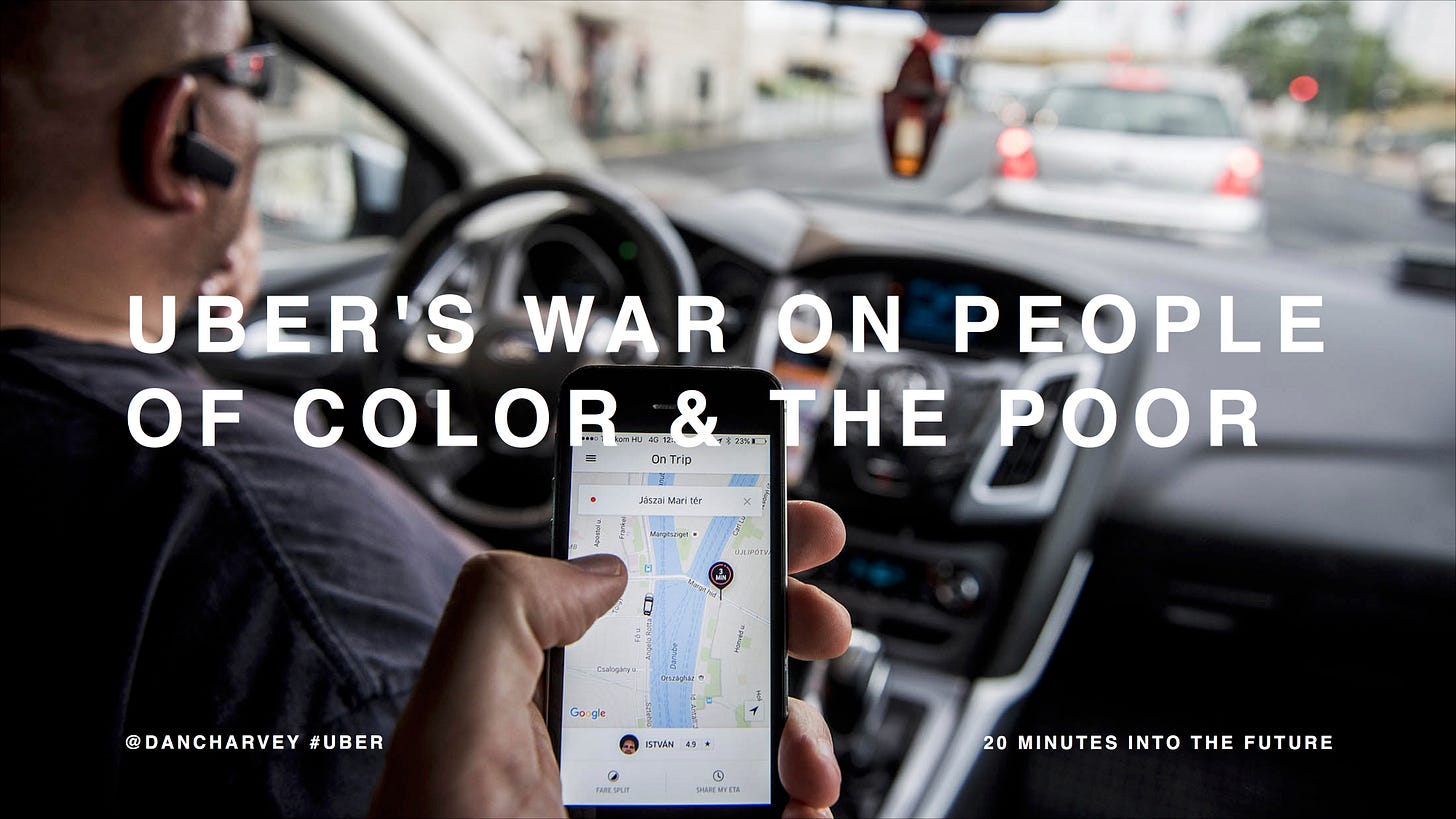Uber's war on people of color & the poor
Hello from 20 Minutes into the Future. This week’s letter is 939 words, a 03:45 minute read. Tonight we’ll be taking a critical look at Uber's negative impact on the poor, people of color, and the climate.

This post is part 3 of a series, Push a Button, Get a Car, Create Economic Injustice. In it, I’m exploring the exploitative nature of Uber’s business and its ramifications for the future. You can read the first and second posts if you'd like to get up to speed. Up now, how Uber discriminates against people and fucks the planet while it does it. Let’s ride.
This series has touched a nerve with readers. Lots of support from cyber-curmendgeons and soul-searching from Uber customers. And even some angry defense from people who think Uber's good outweighs it's bad.
I'm writing this week's letter with that last group in mind most of all. There seems to be a lot of mistaken assumptions out there about how much good Uber is creating. As I've mentioned throughout the series, there are plenty of issues with taxi services. They're city-exclusive, they're expensive, drivers are racist & sexist, climate impact, et al. Mass transit is very political and intersects with race, class, and other issues.
Why? Because the working poor and people of color use public transportation the most. In NYC 75% of public transit commuters are PoC with median yearly earnings of $35,000. In LA 89% of public transit commuters are PoC with median yearly earnings of $15,000. Houston's data resembles LA's
Despite anecdotes and PR to the contrary, Uber hasn't solved any of those service issues. Because it's rich white founders never experienced them in the first place! So why would they try to solve them? In fact because of their privilege, they've replicated the issues. Or are complicit in making matters even worse.
The large majority of Uber's usage is city-based. 35% of people who live in large cities use ridesharing (another 7% use it via friends who have the app). Only 7% of people in suburban settings do. Rural usage is nonexistent. Over 70% of vehicle miles traveled (VMT) for ridesharing companies is in the city core.
The affluent are the biggest base of rideshare customers. 26% of American earning $75,000 or more use rideshare. Only 10% of American's earning $30,000 or less use it. And as we discussed last week Uber (and yes, Lyft) offsets costs by subsidizing fares by as much as 50%. Of course, during surge pricing fares are much more expensive than normal taxis.
Uber drivers skew white as compared to traditional taxi drivers. Uber drivers in Boston cancel on black passengers at double the rate of normal cabs. Black passengers in Seattle endure triple the wait times of white passengers. Drivers in Dallas refuse passengers heading to or from black neighborhoods. On and on.
Women suffer longer and more expensive routes than men. This is gender-stereotyped profiteering ("women don't know where they're going"). And also sexual harassment as drivers use the extra time flirting. Which given Uber's misogyny* and poor* track* record* of protecting women is disgusting. *Trigger warning: those links go to stories about sexual harrassment, rape and kidnapping.
Despite rhetoric that ridesharing was good for the environment the opposite is true. In San Francisco it accounts for 65% of weekday VMT. What's even worse, is 1/3 of those miles are with empty backseats i.e. no passengers ("deadheading" in driver slang). In NYC from 2013 to 2017 rideshares were responsible for 59% more cars on the road. In London Uber drivers outnumber black cabs by a margin of 3 to 1.
The taxi industry wasn't the only incumbent disrupted by ridesharing. Car-sharing has been too. Services like ZipCar and Car2Go have seen their memberships drop by as much as 50%. 23% of those who've abandoned car-share services cite ridesharing as the reason why. Which amplifies the climate impact as car-sharing is greener as there's no deadheading.
All that taken together means poor and PoC communities get fucked over by Uber in many ways:
Lost service as Uber's cheap subsidized fares drive taxi companies out of business.
Lost income for drivers forced out of the taxi industry into Uber since Uber pays below minimum wage.
Lost economic opportunity for communities of color. In NYC, 90% of drivers hail from countries like Haiti and The Dominican Republic.
Minimal service as white drivers redline black neighborhoods.
Climate change, exacerbated by added vehicle congestion, hits poor and black communities hardest.
And that's only the tip of the iceberg. Uber's end goal is the privatization of public transit. More on that next week.
File under: #uber #gigeconomy #businessmodels #economicinjustice
Next week: How Innisfil, Ontario gets under the hood of Uber's endgame.
Thanks for reading 20 Minutes into the Future. Have a friend or colleague who'd like the newsletter? Invite them to sign up. Any friend of yours is a friend of mine. Good night, and good future.
20 Minutes into the Future is a critical look at how technology is shaping our lives today. And what actions we can take for a better tomorrow. If you you're not already a subscriber and found this newsletter worth your while then please sign up.
Daniel Harvey writes 20 Minutes into The Future. He is a product designer and has written for Fast Company, Huffington Post, The Drum, & more. If you're pissed about the current state of tech and want to see us do better then you’ve found a kindred spirit.
You can email him at daniel.harvey@gmail.com or follow him on Twitter @dancharvey.



